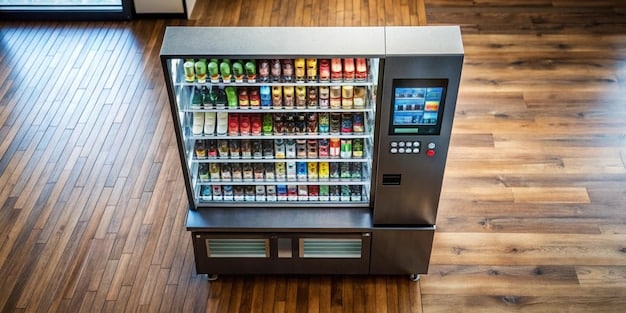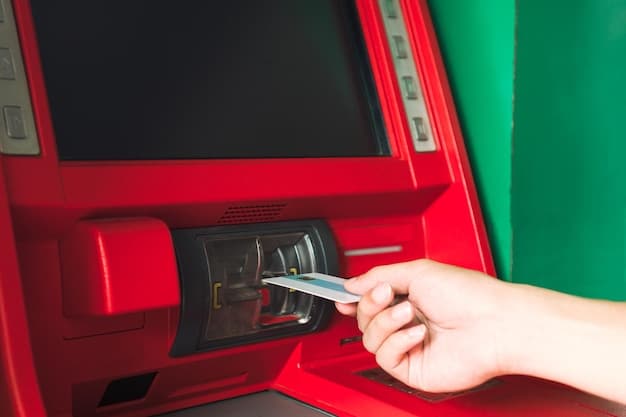Generate Passive Income: Vending Machine Business Guide (US)

Generate passive income by starting a vending machine business in the US, a potentially lucrative venture that offers flexibility and scalability with strategic planning and execution.
Looking for a reliable way to generate passive income with vending machines: a comprehensive guide to starting a vending machine business in the US? This guide provides a detailed roadmap for launching and managing a successful vending machine business in the United States, offering a blend of upfront effort and long-term earnings.
Vending Machines: a Lucrative Passive Income Stream
The appeal of passive income lies in its potential to generate earnings with minimal ongoing effort. A vending machine business can be a viable option for those seeking a consistent revenue stream.
This guide will walk you through the essential steps, helping you understand the nuances of this business model.

Understanding the Vending Machine Business Model
Before diving in, it’s crucial to understand the fundamentals. A vending machine business involves purchasing, stocking, and maintaining vending machines at various locations.
Profit is generated from the difference between the cost of goods and the revenue from sales.
- Location is Key: High-traffic areas are essential for maximizing sales.
- Product Selection: Offer products that cater to the specific needs and preferences of the location’s demographic.
- Maintenance: Regular maintenance and restocking are crucial to ensure customer satisfaction.
Success depends on strategic planning and consistent execution.
Initial Investment and Startup Costs
Starting a vending machine business requires careful financial planning. Understanding the costs involved is crucial for success.
From purchasing machines to securing locations, these initial investments can vary widely.
Vending Machine Costs
The cost of vending machines can range from a few thousand dollars for used machines to tens of thousands for new, state-of-the-art models.
Consider the type of machine you need based on the products you plan to offer.
Location Fees and Permits
Securing locations for your vending machines often involves paying a commission or rental fee to the property owner.
Additionally, you’ll need to obtain the necessary business licenses and permits to operate legally.
- Research Local Regulations: Understand the specific requirements in your area.
- Negotiate Lease Terms: Aim for favorable terms with property owners.
- Factor in Insurance: Protect your business with appropriate insurance coverage.
Careful budgeting and financial planning will set a good foundation for your vending machine venture.
Finding the Right Locations for Your Vending Machines
Location is arguably the most important factor in determining the success of your vending machine business. Placing your machines in high-traffic areas frequented by your target demographic can significantly boost sales.
Identifying and securing prime locations is essential for maximizing your return on investment.

Assessing Potential Locations
Before committing to a location, conduct thorough research to evaluate its potential. Consider factors such as foot traffic, demographics, and competition.
Observe the area during peak hours to gauge the number of potential customers.
Negotiating with Property Owners
Once you’ve identified promising locations, approach property owners with a professional proposal. Be prepared to negotiate lease terms and commission rates.
Highlight the benefits of having a vending machine on their property, such as increased convenience for employees and customers.
- Prepare a Detailed Proposal: Outline the products you plan to offer and the benefits for the property owner.
- Offer a Competitive Commission: Be willing to negotiate a fair commission based on sales.
- Provide Excellent Service: Maintain your machines regularly and respond promptly to any issues.
Securing the right locations can be a game-changer for your vending machine business, leading to consistently high sales.
Choosing the Right Products to Sell
The products you choose to sell in your vending machines can significantly impact your profitability. Selecting items that cater to the specific needs and preferences of your target demographic can drive sales and increase customer satisfaction.
Consider factors such as local trends, seasonal demands, and dietary preferences when making your selections.
Snacks and Beverages
Traditional vending machine staples like chips, candy bars, and sodas remain popular choices. However, consider offering healthier alternatives to cater to health-conscious consumers.
Options such as granola bars, trail mix, bottled water, and fruit juices can appeal to a wider audience.
Specialty Items
Depending on the location of your vending machines, specialty items can be a lucrative addition to your product offerings. For example, placing a vending machine in an office building could justify offering items like coffee pods, energy drinks, and office supplies.
Similarly, vending machines located in gyms or fitness centers could feature protein bars, workout supplements, and sports drinks.
- Analyze Sales Data: Track which products are selling well and which ones aren’t.
- Stay Updated on Trends: Keep an eye on emerging food and beverage trends.
- Offer Variety: Provide a range of options to cater to different tastes and preferences.
Smart product selection ensures that your vending machines offer items that are both appealing and profitable.
Managing and Maintaining Your Vending Machine Business
Efficient management and regular maintenance are crucial for the long-term success of your vending machine business. This includes everything from restocking products and collecting cash to performing routine maintenance and addressing any technical issues that may arise.
Proactive management ensures that your machines are always operational and that your customers remain satisfied.
Restocking and Cash Collection
Develop a schedule for restocking your machines and collecting cash based on sales volume and product expiration dates. Use a systematic approach to ensure that your machines are always well-stocked and that your cash handling is accurate and secure.
Consider investing in a mobile payment system that also offers remote monitoring and inventory tracking.
Routine Maintenance and Repairs
Regularly inspect your vending machines for any signs of wear and tear, and perform routine maintenance tasks such as cleaning and lubricating moving parts. Address any technical issues promptly to minimize downtime and customer dissatisfaction.
Consider establishing a relationship with a reliable repair technician who can provide timely assistance when needed.
- Create a Schedule: Set specific days and times for restocking and maintenance.
- Keep Detailed Records: Track inventory, sales, and expenses.
- Invest in Technology: Utilize modern payment and remote monitoring solutions.
Consistent management and maintenance maximizes uptime, reduces repair costs, and builds trust with your customers.
Scaling Your Vending Machine Business
Once you’ve established a successful vending machine business, consider scaling your operations to increase your revenue and profitability. This could involve adding more machines to your existing locations, expanding to new locations, or diversifying your product offerings.
Strategic scaling allows you to leverage your existing infrastructure and expertise to achieve even greater success.
Adding More Machines
If your existing locations are performing well, consider adding additional machines to increase your sales volume. This can be particularly effective in high-traffic areas with limited vending machine options.
Ensure you have sufficient capital and resources to support the additional inventory and maintenance requirements.
Expanding to New Locations
Explore opportunities to expand your vending machine business to new locations in your area. Identify areas with underserved populations or untapped market potential.
Conduct thorough market research to ensure that the new locations are a good fit for your product offerings.
- Analyze Performance: Identify your most profitable locations and replicate their success.
- Seek Strategic Partnerships: Collaborate with businesses or organizations to secure desirable locations.
- Invest in Inventory Management: Ensure you can efficiently manage a larger inventory volume.
Careful expansion maximizes your earnings, diversifies your revenue streams, and solidifies your presence in the market.
| Key Point | Brief Description |
|---|---|
| 📍 Location, Location, Location! | High-traffic spots are crucial. |
| 💰 Startup Costs | Budget for machines, locations, and permits. |
| 🥤 Product Selection | Offer popular and profitable items. |
| 🛠️ Maintenance Matters | Keep machines clean and well-stocked. |
Frequently Asked Questions
▼
Startup costs can vary widely, ranging from a few thousand dollars to tens of thousands, depending on the number and type of machines you purchase, as well as location fees and permits.
▼
The most profitable products often include popular snacks and beverages like chips, candy bars, sodas, and bottled water. However, healthier options and specialty items can also be lucrative.
▼
Location is paramount. High-traffic areas frequented by your target demographic are essential for maximizing sales and profitability. Research and select locations carefully.
▼
Key maintenance tasks include regular cleaning, restocking products, collecting cash, and performing routine inspections to identify and address any technical issues promptly to minimize downtime.
▼
Scaling your business can involve adding more machines to existing locations, expanding to new locations, or diversifying your product offerings to cater to a wider range of customers.
Conclusion
Starting a vending machine business can offer a viable route to passive income in the US, requiring dedication in the initial setup, researching locations, and selecting products. However, with strategic planning and consistent execution, the vending machine business presents a scalable opportunity for generating consistent revenue with minimal ongoing effort.





